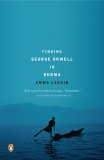Summary | Excerpt | Reviews | Beyond the Book | Readalikes | Genres & Themes | Author Bio

Critics' Opinion:
Readers' Opinion:
First Published:
Jun 2005, 240 pages
Paperback:
Mar 2006, 304 pages
 Book Reviewed by:
Book Reviewed by:
BookBrowse Review Team
Buy This Book
In Burma there is a joke that Orwell wrote not just one novel about the country, but three: a trilogy comprised of
Burmese Days, Animal Farm and Nineteen Eighty-Four.
AS I WALKED down a busy street in Mandalay on my first visit to Burma, in 1995, a Burmese man strode purposefully towards me twirling a black umbrella. He smiled brightly and said,
'Spread our need of democracy to the rest of the world—the people are so tired.' Then he turned around and walked briskly away. And that was it: one of the few, fleeting glimpses I had that all is not as it seems in Burma.
During the three weeks I spent wandering through postcard perfect scenes of bustling markets, glittering pagodas and faded British hill stations I found it hard to believe I was travelling through a country that has one of the worst records for human rights abuse in the world. To me, this is the most staggering thing about Burma: that the oppression of an entire nation of some 50 million people can be completely hidden from view. A vast network of Military Intelligence spies and their informers ensures that no one can do or say anything that might threaten the regime. The Burmese media—books, magazines, movies and music—are controlled by a strict censorship board and government propaganda is churned out not only through newspapers and television, but also in schools and universities. These methods of reality-control are kept firmly in place by the invisible, though ever present, threat of torture and imprisonment.
For an outsider like myself, unable to see beyond the façade the generals have created, it was impossible to imagine the daily fear and precariousness of living in such a state. It was during my efforts to understand this aspect of Burmese life that I became fascinated by Orwell. All his novels explore the idea of individuals being trapped within their environment, controlled by their family, the society around them or an all-powerful government. In
Nineteen Eighty-Four he conjured up the ultimate vision of oppression, even giving us the language with which to describe it:
'Big Brother', 'Room 101', 'Newspeak'.
As I reread Orwell's novels—books I had not read since my schooldays—I became curious about his personal connection with Burma. What was it that had made him trade his career in the colonies for that of a writer? And why, after nearly a quarter of a century away from Burma, did he look to the country for inspiration while he lay on his deathbed? I began to imagine that Orwell had seen something in Burma, had had some thread of an idea, that had worked its way into all his writing. I looked through the various biographies that have been written about Orwell, but their authors seemed to underplay the significance of Burma and, as far I could gather, none of them had ever conducted any research in the places where Orwell spent five life changing years. The towns and cities where Orwell was posted span the geographical heart of the country and, in a sense, it is still possible to experience Burma as Orwell knew it—almost half a century of military dictatorship has given it the air of a country frozen in time. But a journey through Orwell's Burma would lead through an even eerier and much more terrifying landscape: that of a real-life
Nineteen Eighty-Four
FOREIGN WRITERS and journalists are denied entry to Burma. Occasionally some are able to slip into the country posing as tourists, but if they are discovered their notebooks and photographic film are confiscated and they are swiftly deported. For the Burmese people they interview, the repercussions are infinitely greater. Under the country's 1950 Emergency Provisions Act, providing foreigners with information that the regime considers inimical is punishable with a seven-year prison sentence. Though I worked as a journalist, I rarely wrote about Burma and so it was still possible for me to blend in among tourists or the small expatriate community of business people who are granted long-stay visas. In basing a book on my experiences there were concessions to be made: I would have to change the names of the Burmese people I spoke with and, in some cases, their locations. But, if I was careful, it would be possible to forge a pathway through this seemingly impenetrable country..
From Finding George Orwell in Burma by Emma Larkin, pages. Copyright Emma Larkin 2004. The complete text of the prologue, pages 1-6. Reproduced by permission of the publisher The Penguin Press.





The Funeral Cryer by Wenyan Lu
Debut novelist Wenyan Lu brings us this witty yet profound story about one woman's midlife reawakening in contemporary rural China.
Your guide toexceptional books
BookBrowse seeks out and recommends the best in contemporary fiction and nonfiction—books that not only engage and entertain but also deepen our understanding of ourselves and the world around us.